Wecare – Care for elderly mental well-being at a distance
Violet zhang
A digital mental health tool supports caregivers in providing better remote caregiving for the elderly.
Statement
As our global population rapidly ages, the demand for comprehensive care and support among the elderly has surged. The COVID-19 pandemic has further underscored this urgency, revealing profound challenges in remote care, exacerbating the vulnerability of the elderly, and magnifying emotional distress stemming from age-related physical decline. Yet, amidst this pressing need for holistic care, a concerning trend persists: the majority of products available on the market prioritize physical health and accessibility, often neglecting the crucial aspect of mental health support. Our mission is to bridge this gap by advocating for and designing innovative solutions that prioritize both the physical and mental well-being of our elderly population, ensuring dignity, comfort, and enhanced quality of life for all.
This is part of a two-year graduate thesis. Wecare is a research-driven project that seeks to comprehend the transformations in elderly individuals and the influence of social and cultural aspects that shape these changes. The objective is to create a digital mental health tool for remote caregivers, aiming to address the urgent requirement for proactive support in the mental well-being of the elderly.
Motivation and initial desk research
The Chinese government enforced the One-Child Policy from 1980 to 2016 for 36 years, leading to various adverse effects. The policy caused a decline in birth rates, tilted the gender ratio favouring men, and changed traditional family patterns.
In the past, parents could expect support from multiple children in old age, but now they rely on one child. This shift has placed a heavy emotional burden on the only child, who cares for aging parents and grandparents in what’s called the 4-2-1 family structure.
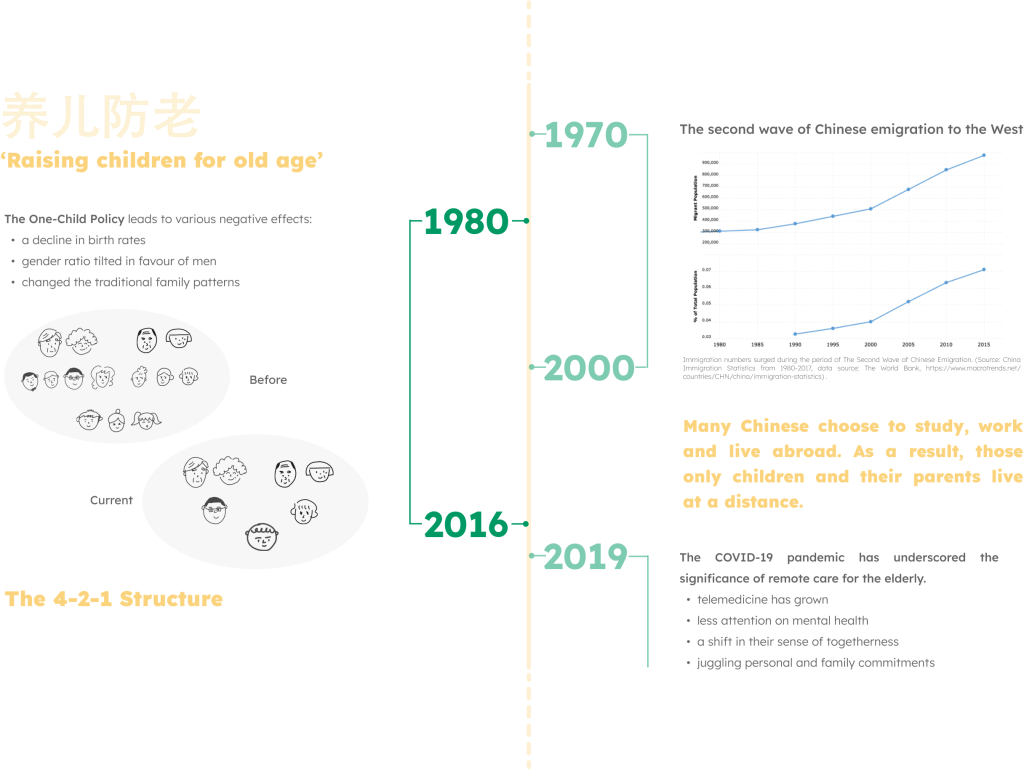
Meanwhile, the second wave of Chinese emigration to the West started in the late 1970s. Many Chinese choose to study, work and live abroad. As a result, those only children and their parents live at a distance.
In recent years, the COVID-19 pandemic has underscored the significance of remote care for the elderly, amplifying their sense of vulnerability due to age-related physical decline. Although telemedicine has grown, mental health often receives less attention than physical health, indicating a need for design to support elderly individuals and remote caregivers.
I’ve observed many people struggle to balance personal preferences with family obligations when their parents live far away, often feeling guilty for not providing adequate care. Concerns also arise about their parents’ ability to adapt to a new environment if they are invited to live in another country.

Reflecting on my 16 years in Canada, from being an international student to a settled immigrant, I remember the struggle of balancing my own choices with the desire to be with my family. However, I’ve realized I’m not alone; we’re a community. Many families and friends share similar concerns. As a designer, I aim to use my skills to identify issues and propose design solutions to the challenges of remote caregiving, mainly focusing on mental well-being.
Framing research
My research aims to improve understanding of mental health issues among the elderly and their caregivers. I hope to encourage their connection and identify mental health issues early to prevent problems
How can we design a solution that addresses the factors influencing the mental health of the elderly, particularly in the context of remote caregiving?
This question considers the challenges that only-child caregivers face in Canada and the elderly in China in the Chinese family setting. By examining this demographic as a case study to explore the daily challenges of caregiving and develop a reference framework for supporting remote caregiving. Hopefully, it also inspired the wider population of families in other cultures with similar family patterns.
However, this research will not involve professional mental health diagnostic tests for use in clinical settings. Instead, it will integrate research findings to design a comprehensive tool to assist caregivers, focusing on promoting awareness of mental health care.
For more research details, please visit https://violetzhang.myportfolio.com/wecare
Design Goal
Bridge the gap in mental health literacy by raising awareness of several critical aspects:
a.) The correlation between the physical decline of the elderly and its potential impact on their mental health.
b.) It Is important for caregivers to recognize and manage their mental health amidst their responsibilities.
Wecare is a digital health tool for distant caregivers, who often find themselves under the immense pressure of looking after the elderly. It addresses the critical need to proactively understand and address potential mental well-being issues that can arise in elderly individuals. The product will be presented as a responsive web application suitable for websites, tablets, and phones.
Definition of Audiences
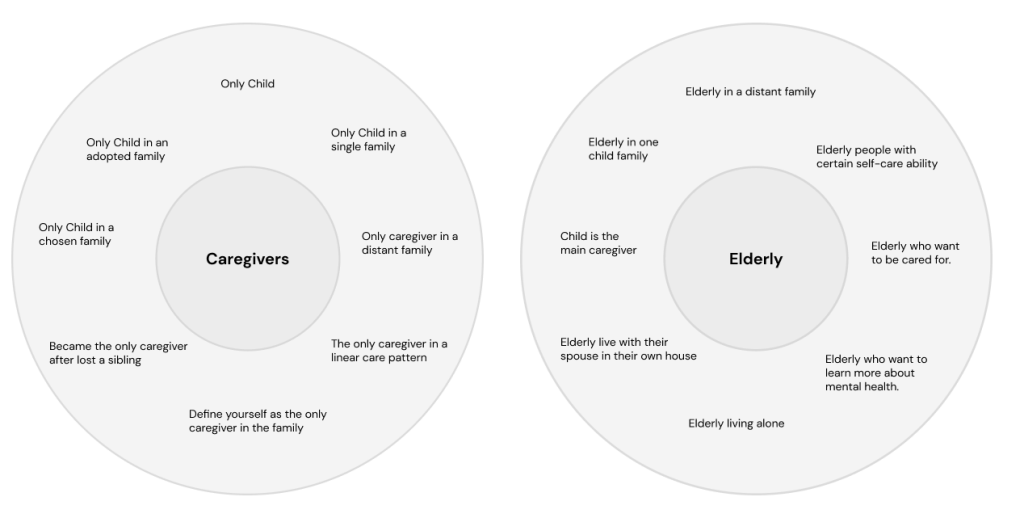
The primary audience is adult children who serve as caregivers, including a diverse group of single, adopted, or chosen family members. Families that have lost a sibling and now find themselves as the only caregiver are potential primary users as well. The secondary users are elders who fit into the situation, such as having only one child, living alone, being with a distant family, etc.
Design Framework

In the design framework, the four factors in the middle – biological, medications, social engagement, and lifestyles – are key elements impacting daily mental wellness. The four factors form the four parameters – physical changes, emotional changes, connection, and environmental changes – which shape the content of Wecare. The assessment questionnaire will extensively focus on the elements highlighted in blue on the left half of the square; only some basic questions will be asked in the red area on the right.
It is important to note that responses indicating concerns in the red areas may raise a red flag, suggesting the need for further advice and consultation. In such cases, seeking help from professional experts is strongly advised.
Persona
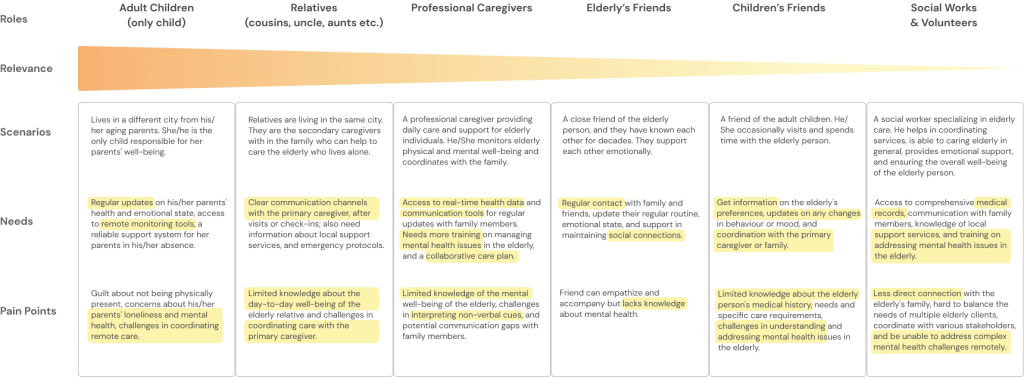
I have identified six distinct personas in mapping through the spectrum of caregiving. Recognizing the intricate nature of caregiving, I have expanded the spectrum to encompass many potential stakeholders within this framework. Adult children, particularly only-child, assume primary caregiver roles due to their inherent responsibilities. Moreover, secondary, tertiary, or even quaternary caregivers include relatives, professional caregivers, children’s friends, elderly acquaintances, social workers, and volunteers.
To better understand the caregiving landscape, I have conducted an analysis that involves scenario assessment, needs identification, and the meticulous highlighting of pain points. This approach has enabled a comprehensive ranking of caregiving relevance, offering insights into the nuanced needs and challenges experienced across these personas.
Feature Loop

Final Prototype examples

Wecare is a digital health tool designed to improve remote caregiving for the mental well-being of our elders. It offers general online assessments, monitoring aids, caregiving tips, mental health literacy blogs, and integrated public resources. Caregivers and elders can easily onboard Wecare and access all features for free. Our mission is to advocate for the importance of mental health in elderly care, facilitating better connections between caregivers and elders while addressing potential psychological issues positively and effectively.
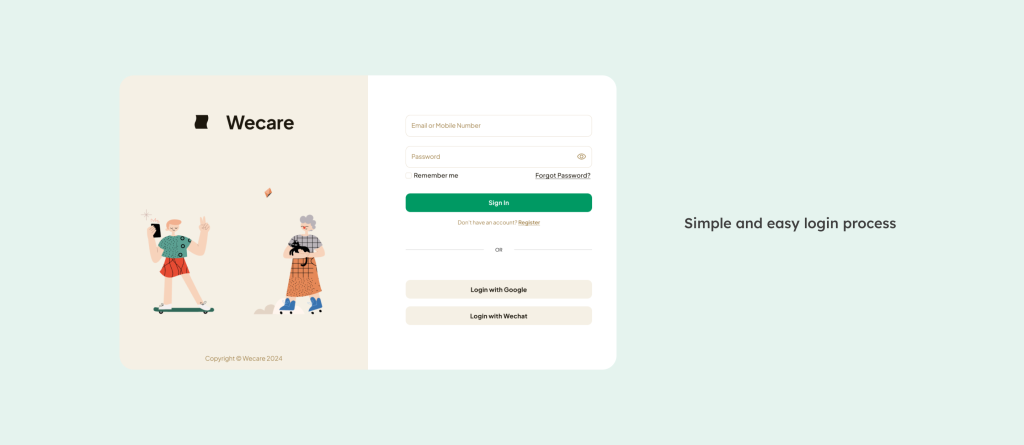
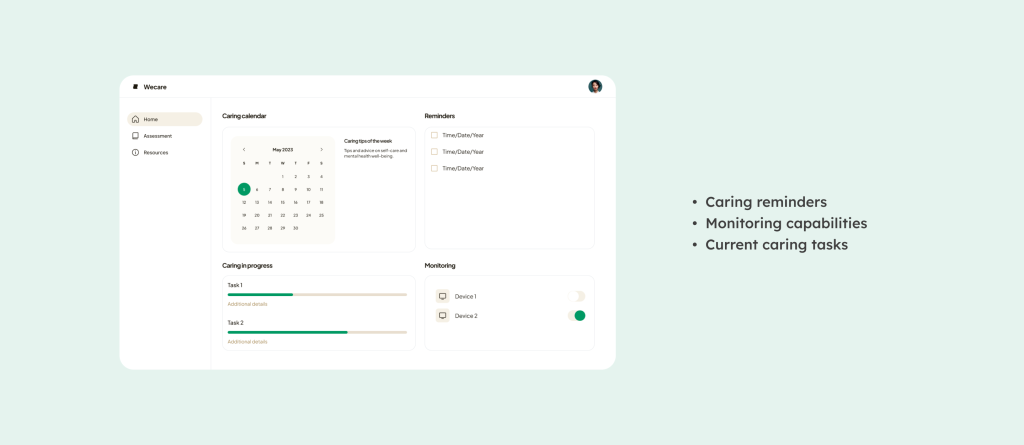
The login interface is simplified to make it easy for elders. Users can also log in using third-party services such as Google and WeChat.
The dashboard has comprehensive functions such as caring reminders, monitoring capabilities, and showing current caring tasks.
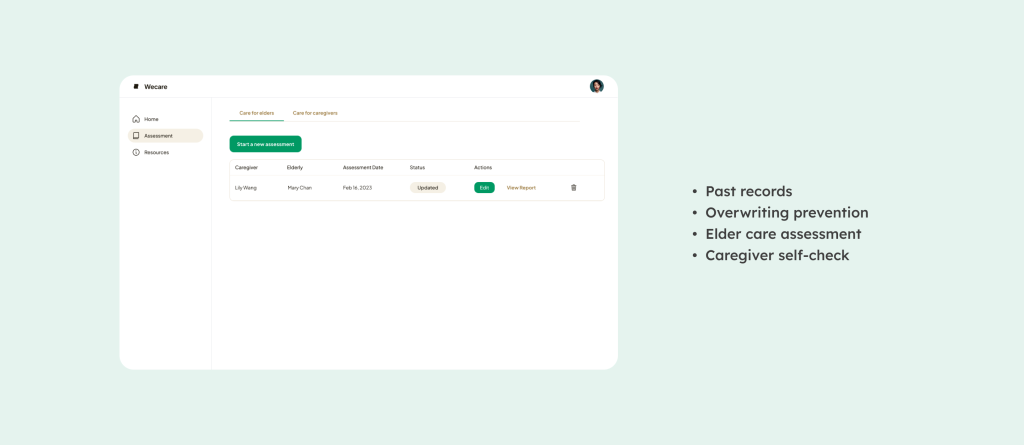
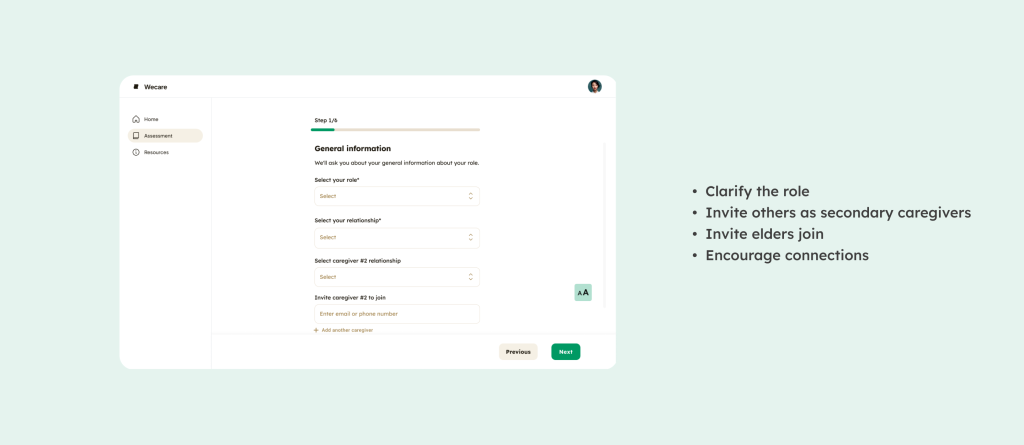
On the assessment summary page, users can view past records. If they find the information provided in previous assessments needs to be more accurate, they can modify it based on the original input. However, previous information will not be overwritten; it will be logged as versions for users to review. Users also have the option to start a new assessment if they choose. Caregivers can also conduct self-assessments to monitor their own mental health status.
During the assessment, caregivers will be prompted to select their role, such as family caregiver, professional in-home caregiver, or other family relatives. Primary caregivers can also add and invite others as secondary caregivers to join the platform. To improve connections between caregivers and elders, caregivers can invite elders to join during the assessments, allowing them to address issues together.
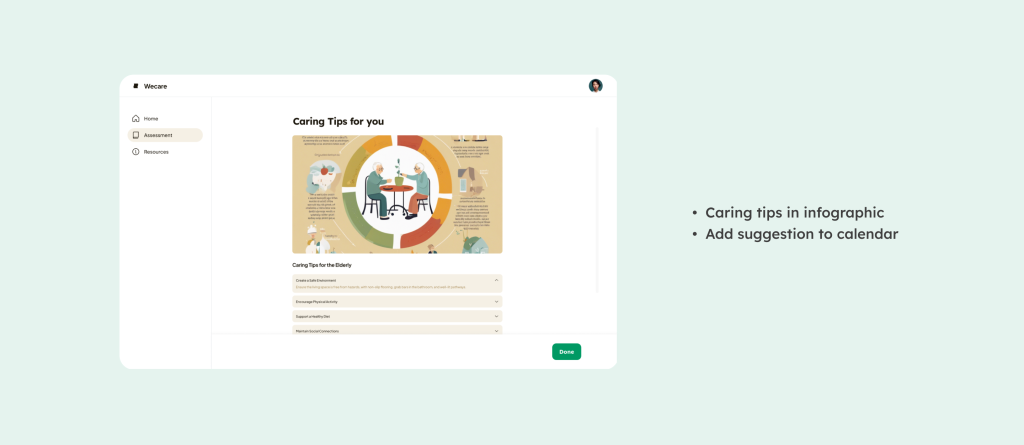
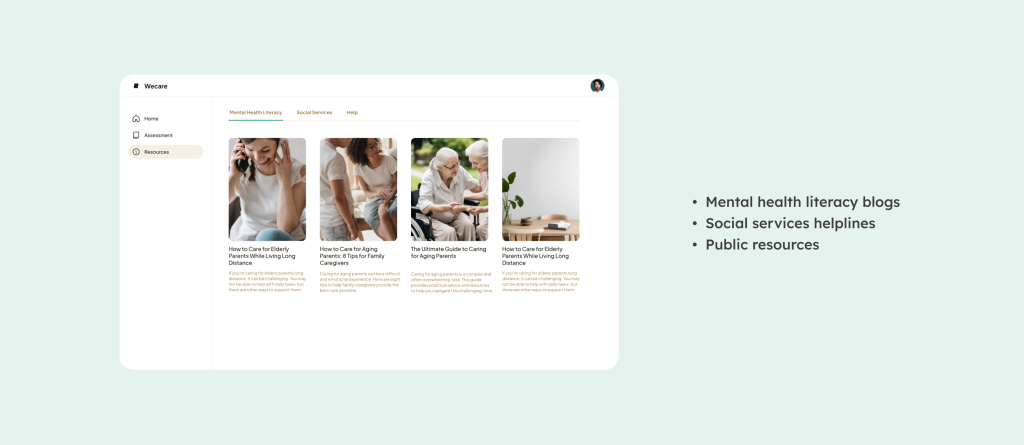
After the assessment, caregiving tips are generated into an intuitive infographic, and caregivers will receive suggestions. They can then add the tips to the calendar and edit or adjust tasks accordingly.
Lastly, mental health literacy blogs, social services helplines, and public resources are essential for caregivers and elders. These resources will be regularly updated to ensure users have access to a wealth of information and fresh insights.
Limitations and Reflections
The research’s limitation was that lots of research acknowledges the complex connection between physical changes, specifically post-surgery recovery, and mental health in elderly individuals. Because of the topic’s vastness and various perspectives from fields such as medicine, neurology, and psychology, it is challenging to cover all aspects comprehensively. Although the primary focus of the research and Wecare is to ease the burden for caregivers, understanding elders’ perspectives is still an area that can be improved and strengthen its integrity.
Future opportunities
Wecare has the opportunity to enhance the current assessment tool by integrating robust backend data support and transforming it into a professional clinical diagnostic tool for initial assessments.
Additionally, there is potential to expand the system into a comprehensive care platform, allowing for features like onboarding counsellors, facilitating consultations, and aiding long-term care home experts. The existing research forms the foundation for Wecare, with future studies, data-driven, and even machine-learning approaches promising its further development and application across various professional fields.




